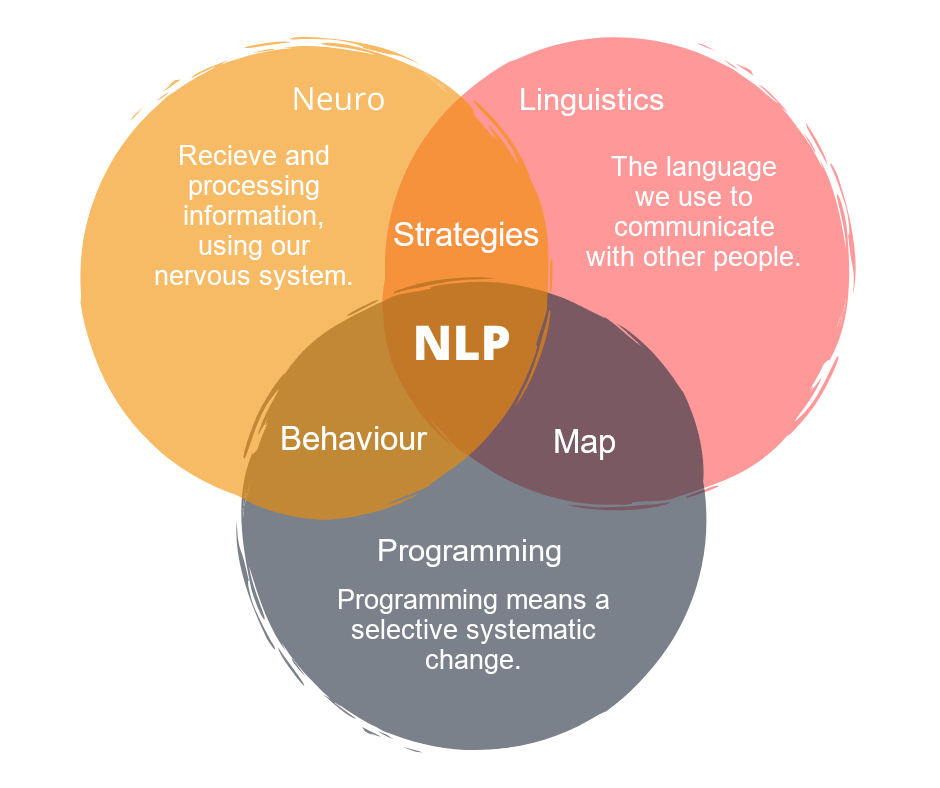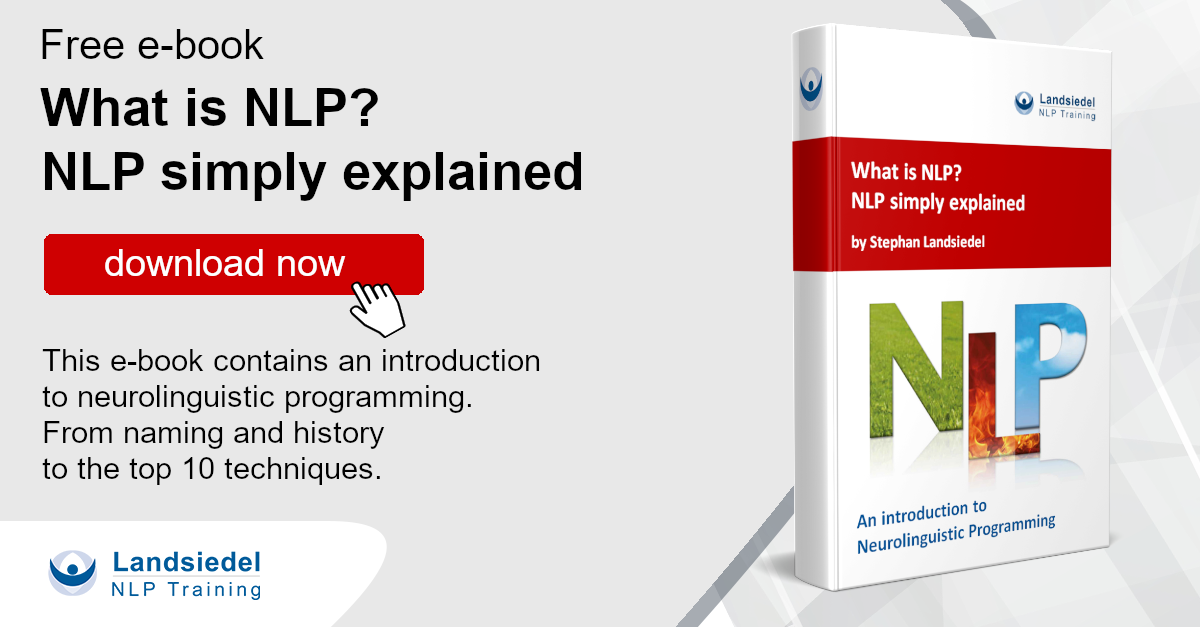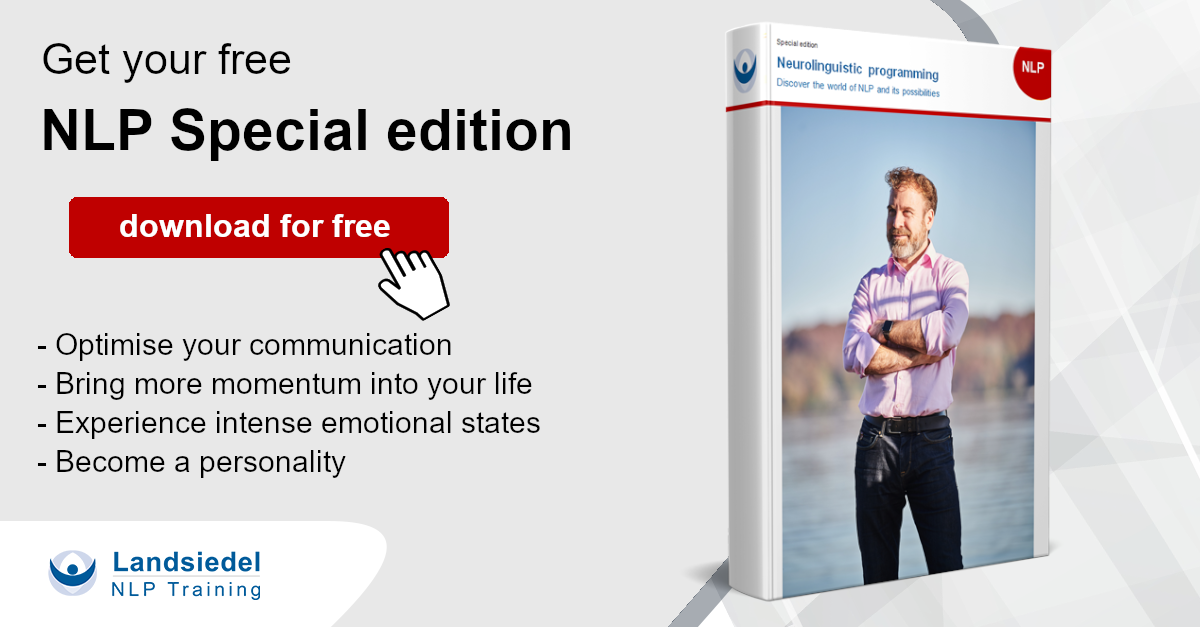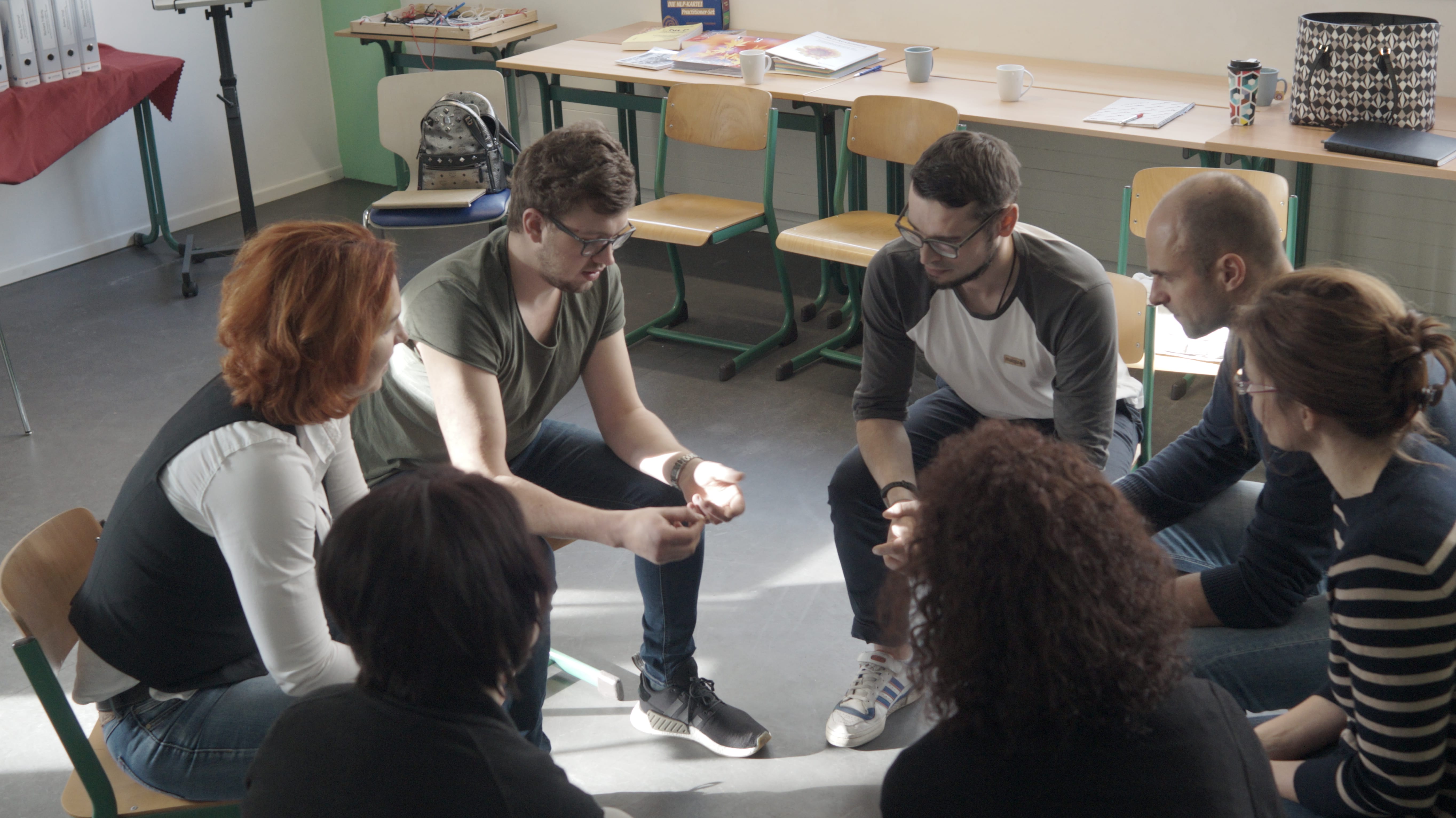What is NLP? NLP simply explained
Neurolinguistic Programming, NLP for short, is a motivational and communication model, which was developed in the seventies. It was developed through the analysis of very successful psychotherapists and is used today in various areas of life such as therapy, sales, leadership, partnership and in dealing with children.
The NLP brings together conversation-, behaviour-, hypno- and body-oriented approaches. In the process, our thinking, feeling and behaviour (neuro) are systematically changed (programmed) by means of language (linguistics).
Table of contents
- What does NLP stand for?
- What are the Benefits of NLP?
- Where does NLP come from?
- Quotes on NLP
- Is NLP dangerous?
- The Effectiveness of NLP
- The Presuppositions of NLP
- Top 10 NLP Techniques
- How to learn NLP?
- How do I start as a NLP Beginner?
- Possibilities to learn NLP
- NLP Trainings
- NLP Certificates
- Fields of Application

What does NLP stand for?
- Neuro:
Neuro refers to the nervous system that we need to absorb and then process information from the environment through our sensory organs. Our perception, thinking, feeling and behaviour depend on our nervous system.
- Linguistics:
Linguistics stands for language that we use to communicate with other people on the outside and at the same time with ourselves on the inside. Words create our inner reality.
- programming:
Programming means a purposeful systematic change. The NLP approach means: I change as purposefully as possible and maintain this change so that I can build on it. This way I do not have to start from scratch every time.
You would like to improve your communication to be more successful in dealing with people? You want to be more creative and especially develop your full potential? Then use NLP to make your life and personality more successful and happier!
What are the Benefits of NLP?
- Consciously dealing with your emotions in everyday life
- Sharpening your own perception
- Communicate in a new quality
- A positive way of thinking
- Change negative behaviour in the long term
- Finding target-oriented solutions
Participants learn useful techniques in their NLP trainings which are intended to help them in their areas of life.
➤ If something goes wrong again, it doesn't necessarily have to be bad.
The question is: "How do I make the best of it? Why could the situation even be good for me?"
➤ Positive intentions can also hide behind negative behaviour. Stubborn and defensive behaviour might even be helpful, depending on the context.
The question is: "Where could my behaviour be useful?" On the whole, NLP promotes self-reflection.
NLP graduates often report that NLP has changed their perception and they had a much more positive way of thinking after the training. Sometimes a single thought is enough to bring about change.
Of course NLP can also be used in therapeutic areas. For years the method has successfully found its way into psychotherapeutic practices, counselling centres and psychosocial institutions. Alternative practitioners and psychotherapists use NLP to change the behaviour of their clients in a sustainable way.
Professional NLP trainers use NLP techniques in goal-oriented Coachings and thus promote the strengths of the coachees. The areas of application of NLP are immense and there are no limits to the use of NLP.

Where does NLP come from? The origin



Richard Bandler, John Grinder and Frank Pucelik met in the seventies. At that time John Grinder was assistant professor of linguistics at the University of California, Santa Cruz. Richard Bandler was a mathematician, gestalt therapist and computer specialist. Together with Frank Pucelik, they wanted to learn continuously and develop themselves further.
They found out how experts achieved very special achievements in their fields. For example, John Grinder, Richard Bandler and Frank Pucelik began to take successful people to model and recognise the patterns they used to achieve their goals. For example, they explored why some well-known psychotherapists were so successful in treating their clients and others were not. They realised that their work had to be based on a common pattern of behaviour.
Bandler, Grinder and Pucelik developed a model that is applicable to everyone and promotes communication, learning and personal change. They called it "Neurolinguistic Programming". Bandler, Grinder and Pucelik passed on their knowledge to students in workshops and courses. They became particularly famous for modelling hypnotherapist Dr Milton Erickson, family therapist Virgina Satir and Gestalt therapist Fritz Perls.
Learn more about the history of NLP.
Quotes on NLP
"If anybody can do something, so can you!"
Richard Bandler
"NLP is a usermanual for your brain!"
Richard Bandler
"Whatever another person says can't make us who we are, as long as we ourselves do not allow it."
Virginia Satir
"The only thing standing between you and your success is the story you keep telling yourself!"
Anthony Robbins
Is NLP dangerous?
Attention! NLP is dangerous if the user has not completed a professional training that explains what problems can occur with certain types of treatment. If not properly carried out, trance induction, confrontation therapy and trauma treatment can cause long-term psychological damage to the client.
Many interventions must not be carried out at all, if there is no authorization as an alternative practitioner or psychotherapist. Professional NLP trainers know exactly how far their competences reach and where their limits lie in their application.
On the other hand, NLP can lead to excessive self-esteem and feelings of omnipotence. Consequently, users may believe that they are invulnerable to the knowledge. Completely free from the burden of the ability to be self-critical and through self-affirmation, users can lose their footing.
Why NLP is criticised is often due to the bias, ignorance, hasty associations and negative individual experiences of the respective person. Although the roots of the method are anchored in science and there are many studies that speak for its effectiveness, there are still critics who claim that NLP is not scientifically sound enough.
Others believe that NLP can be used to read minds and manipulate people. NLP is a danger An insight into the techniques opens up many new possibilities, which can lead, among other things, to directing a person's behaviour in a preferred direction. Knowledge about oneself and others, and a deeper knowledge of human nature, can be described as manipulation.
You should also be sceptical about the promises of vociferous marketers. "NLP leads in no time to luck, wealth and success" is a popular phrase that should not be believed too much. In reality it is not quite that simple after all.

The Effectiveness of NLP
The subconscious mind plays an important role in decisions and actions. Richard Bandler and John Grinder already proceeded from this assumption in the seventies. In their work they take into account that the unconscious has to be included in profound change work. Only when the brain is taken into account can change work prove to be truly sustainable and effective.
A new behaviour must be programmed and practised. Neuronal networks that are frequently used form a "brain highway", whereas networks that are rarely used "overgrow" like a jungle. If the behaviour is not programmed correctly, the brain may choose the old path again and drive on the brain highway.
What does this have to do with NLP? In NLP new behaviour is made accessible to the brain. Via a so-called Future Pace, alternative actions are already programmed into the path network of the brain for the future. Also the objective of NLP, to no longer have to deal with a problem, but to focus on the solution, opens up the willingness to change. With the help of various tools, users can change behaviour and emotions in a targeted and, above all, sustainable manner.
The Presuppositions of NLP
The map is not the area.
We all have different conceptions of the world, but none of these represents the world completely and accurately. People do not react to reality themselves, but on their own representation of reality.
There are no errors - only feedback.
Every reaction and every event can
be used as feedback and as an opportunity for learning.
There are no right or wrong models in the world.
However, some models are more useful than others for performing certain tasks. If you want to go on a hike with a car atlas
who is not using such a useful model at the moment. The hike would be easy with a hiking map. Nevertheless the
Autoatlas not wrong.
Every human being has all resources within him/her.
In NLP we assume that people are full of resources. But sometimes they do not have access to them.
Then an experienced programmer helps to restore access. With appropriate resources, people can solve problems
solve problems and accomplish amazing things.
People make the best subjective choice within their model of the world.
If people have different and more appropriate ways of meeting their needs, would
they do not do much of what sometimes seems to happen out of pure malice.
Behind every problematic behaviour/symptom there is a good intention.
All behaviour is intended to have a positive function in the life of the person concerned, independently
of possible negative side effects.
For every behaviour there is a context in which it can be useful or useful.
Learned is learnt, which means that the behaviour will eventually lead to the desired goal.
The aim is also to develop more choices in addition to this behaviour.
resistance on the client's side means lack of flexibility of the consultant.
Resistance does not result from malice of the opponent, but is an indication of
missing repeat. The consultant can therefore do something himself to ensure that the connection to the client is correct.
If something does not work, do something else.
All too often we expect that we just have to try it long enough. But when you run into the wall,
then it can take quite a long time to get through them. So it would be good to try a different approach and
for example to look for a door.
Here you can find more about Presuppositions of NLP.

Top 10 NLP Techniques
NLP offers effective methods in the most diverse areas of application. They serve to improve communication and the respective areas of life. All techniques are basically effective, you just have to know how to implement them. Apply the techniques in your everyday life and improve your perception.
Rapport
Rapport is the positive relationship between individuals, characterised by mutual respect, understanding and trust. Masters of communication meet their interlocutor in his experience of the world and guide him on this basis. First, rapport, i.e. trust, is established. In pacing, the person who wants to lead adapts his or her behaviour, body language, facial expressions, voice and speech to those of the interlocutor. Then he or she moves on to leading.
Exercise: Do you have a conversation that should go well? Perhaps it is a job interview or a meeting. Pick an interview partner and practise with him or her how best to produce a rapport. Here you will get a few suggestions and ideas.Anchoring
An anchor is a stimulus (stimulus, trigger) that triggers a certain, always the same reaction in a person. Listening to a song, for example, can be associated with a feeling of being in love and numerous memories. Conscious anchoring is an extension of the concept of classical conditioning according to Pawlow. In this way, a person can intentionally create desired emotional states.
Exercise: Put yourself in a situation where you have laughed a lot. Take a close look at the feeling of amusement and set an anchor just before the climax of your feeling. For example, make a fist with your hand and press three times. Think of another situation and distract yourself for a moment. Then test the anchor again by balling your hands. Now you should feel amused again.Six-Step-Reframing
Change your behaviour in six steps. Think about the behaviour you want to change and identify the underlying pattern. Make contact with the part of yourself that is responsible for the behaviour. With the help of a creative part inside you, you develop new behaviours and make sure that you implement them in the future. Take a close look at the Six-Step-Reframing.Swish Pattern
With the Swish Pattern, annoying habits can be dissolved and strong motivation built up. Imagine a picture of your unwanted behaviour and additionally create a target picture. Now make a Swish with both pictures: The triggering picture of the context is drawn large and bright. Then place a small dark picture of the target in the lower right corner. The small dark picture gets bigger and bigger until it covers the first picture completely. And Swish!Representation Systems: VAKOG
Man experiences the world through his sense organs. NLP distinguishes between five different senses: visual (see), auditory (hear), kinaesthetic (feel), olfactory (smell), gustatory (taste). By sharpening your senses, you can improve your perception considerably.
Exercise: Three people have read the same book and talk about their experiences. Who uses which representation systems? Click here for the exercises.Meta-Model
When speaking, people like to omit, generalise or distort information. Frequently, erasures, generalisations and distortions are used. If a message sent does not correspond to the message actually meant, misunderstandings can arise. The meta-model is helpful to penetrate into the deep structure of a behaviour or problem.
Exercise: During the next conversation, pay attention to what language your counterpart uses. If something is unclear, ask. When can you use the meta-model and certain question techniques to clear up misunderstandings in conversation?Smart Method
Set your goals with the Smart method. These should be well-formed, specific, measurable, attractive, realistic and timed. Do you have a goal in mind right now?.
Exercise: Find a place where you feel particularly comfortable. Take a pen and a piece of paper and think: Maybe there is something you have always wanted to do but never really got around to? What are your goals and dreams? Write down your well-formed goal and use the Smart method.Time-Line
With the help of a time line (the "time line"), goals can be planned systematically. Events in the past, present and future are taken into account. Develop an irresistible vision. There are different types of time lines: the in-time type and the through time type.
Exercise: With the Tempting Future technique you can plan your future and pre-programme it on the timeline. Re-imprinting after dilts is an effective format for treating severe trauma and bad experiences in early childhood.Milton Model
The Milton Model is a linguistic reversal of the meta-model. It provides guidance for unspecific language use. Extinctions, generalisations and distortions are used to induce and maintain a trance state. In this way the person comes into contact with the hidden, unconscious resources of his personality.
Exercise: Take a conversation partner and put him or her into trance and relaxation using the speech patterns of the Milton Model. Be as creative as possible: "Perhaps you have just realised that you are breathing in and out slowly and deeply. Maybe you notice that your right little finger is moving straight. While you sit on the chair and hear my voice, you relax.Milton Model
Different types of strategies. There are so-called macro and micro strategies. A macro-strategy is, for example, the step-by-step development of a career: Abitur, studies, doctorate, employment at a university, habilitation, etc. Micro-strategies describe a specific internal way of processing sensory perceptions. If you want to find out what a person does in order to learn successfully and efficiently, it is helpful to know their micro-strategy.
Exercise: Use the love strategy to feel as much in love as possible. Remember a time when you were happy with your partner. What did he or she have to do to make you feel that deep feeling of love? Find out which strategy leads to this feeling and recall the state at any time.
How to learn NLP?
As the saying goes: Practice makes perfect. No master has ever fallen from the sky. Imagine you come home from an exhausting NLP training weekend and put your documents in your desk drawer. Three weeks pass by and by chance you find your documents again. You notice that you can only remember a few exercises. What are you doing now?
Make your decision:
- To repeat some exercises and apply them in everyday life
- To form your own practice groups and exchange information about NLP at regular intervals
- To participate in further courses, trainings and NLP online courses from Landsiedel NLP Training

How do I start as a NLP Beginner?
You can choose from a wide range of training offers as NLP-beginners to put together your desired programme. Maybe you want to focus on NLP and become a master in this field. Maybe you want to work as a coach and give courses yourself.
Which offers come into question? Ask yourself the following questions:
- Would you like to learn NLP from home or on site in a group?
- Which topics interest you most?
- How can you implement the contents of the training in your everyday life?
- What would you like to do later with your completed training?

Possibilities to learn NLP
NLP Online Academy
Have you already discovered our free online courses? Take part in the online courses from the comfort of your own home. Get an overview of the current NLP online course offer. Expand your knowledge and learn more about the subject. The online courses are continuously updated and extended.
Study NLP from home
You don't have time to attend courses and trainings right now, but would you still like to continue your education? Do you prefer to learn from home or do you travel a lot for your job? No problem. NLP enthusiasts can choose from a range of NLP online courses and trainings at Landsiedel NLP Training.
NLP Trainings
NLP Practitioner
The NLP Practitioner Training is the first training to convey the basic theoretical knowledge and practical skills on techniques and methods.
Duration: minimum 18 days and 130 hours
NLP Coach
The training as an NLP Coach according to the standards of the ICI (International Association of Coaching Institutes) will give you the necessary skills and knowledge to be a successful coach. The coaching training is about applying the learned methods of the NLP-Practitioner in concrete coaching contexts.
Duration: minimum 18 days and 130 hours
NLP Master Practitioner
After the NLP Practitioner training the NLP Master Practitioner training is completed. The learned formats are practised in different situations and contexts. In addition some new elements are added.
Duration: minimum 18 days and 145 hours
NLP Trainer
All necessary skills and knowledge needed to conduct NLP trainings are taught in the NLP Trainer Training. Furthermore, the training is interesting for participants who would like to design their seminars, lectures and workshops professionally with the help of NLP. NLP should be applied at the highest level and their pedagogical and communicative skills should be expanded.
Duration: minimum 18 days and 130 hours

NLP Certificates
Upon successful completion of the NLP training, participants receive three certificates:
- INLPTA – International Association of NLP Institutes
- LNLPT – Landsiedel NLP Training
- DVNLP - German Association for NLP




The Associations
INLPTA: The International NLP Trainers Association is an international, worldwide operating NLP trainers association, which is concerned with quality, professionalism, ethics and business applications in NLP. It is represented and connected with each other by its own coordinators in China, Japan, USA, Australia, New Zealand and in most European countries.
DVNLP: The German Association for Neuro-Linguistic Programming (DVNLP) is the largest independent expert forum for people who use NLP in a professional and private context. The vision of the association is to support its members in realising their own visions and to use their skills in the best possible way.
Fields of Application
NLP is used wherever communication and the exploitation of one's own potential are important:
- in the field of psychotherapy
- in business (e.g. in management, human resources, sales, consulting, training, human resources development and corporate functions)
- in pedagogy
- in the health sector
- in personal development
- at sports
- in promoting their own mental and physical health
- in politics
- in education
- in the legal system
- in the development of creativity in writing, the performing and visual arts
- for hobbies etc.
NLP in the company
Every communication begins with ourselves. Good reporting, exact goals, excellent behaviour are three of the most important things in "inner management". Of course, the optimisation of one's own behaviour also increases the quality of leadership in professional and personal relationships. In the business world, successful communication, a relationship based on trust and goal leadership are the be-all and end-all for a successful working day. To this end it helps colleagues, superiors and customers to accept and understand their own world view. Cultural barriers in multinational companies can also be improved with NLP.
NLP in business means:
- to think in a solution- and goal-oriented way
- optimise perceptual capacity
- learn and develop effective strategies for action
Presentation skills and rhetorical training are also a basic component of any modern corporate culture today. Many managers and consultants in companies have been inspired by the creative and innovative aspects of NLP. They use the NLP knowledge base in corporate development, for team building, for the design of future strategies as well as within the framework of comprehensive quality management. NLP skills are also increasingly used in negotiation training.
NLP and Health
In recent years, NLP research has concentrated on this,
- how personal health is acquired and maintained
- how stress can be reduced
- how the healing powers of the body can be demanded and
- how to understand the relationship between health and deep-seated assumptions, beliefs and attitudes
Relevant health topics which are dealt with by NLP: Weight loss, anxiety, sleep disorders, depression, panic attacks, addiction, tinnitus, lovesickness, anxiety disorder, smoking cessation. Of importance is the question of how repetitive patterns and illnesses can be changed so that illness does not reappear in the first place.
For those who want to work alternatively, Yoga offers an excellent, useful and very physical complement to NLP. The physical and mental techniques of Yoga can have a positive influence on your life. You develop peace and quiet in hectic everyday life and improve your health. Learn more about yoga and meditation.

What does NLP have to do with psychology?
When in the 19th and 20th century psychology was almost exclusively concerned with the topics of depression and mental illness, the American psychologist Martin Seligman began to reverse the view and consciously use positive feelings to bring about change. He found that optimism can be learned and he wanted to promote the strengths of others.
Positive Psychology found that you can increase your well-being and happiness by using your character strengths. If a person pursues an activity that makes sense to him and uses his strengths to do so, he lives a much healthier life. Happy people live longer and are less prone to mental illness.
Martin Seligman distinguished six virtues, to which 24 character strengths are assigned:
- Wisdom and knowledge: creativity, curiosity, open-mindedness, joy of learning, perspective
- Courage: Bravery, persistence, integrity, vitality
- Humanity: love, kindness, social intelligence
- Justice: social responsibility, fairness, leadership
- Moderation: Forgiveness and compassion, humility, modesty, prudence, self-regulation
- Transcendence: appreciation of beauty and excellence, gratitude, hope, humour, spirituality.
NLP in psychotherapy and counselling
Historically, NLP has its origins in various short-term therapeutic, solution-oriented, hypno-systemic and constructivist approaches to psychotherapy. In recent years, NLP psychotherapy has been invented - an independent psychotherapy approach, which, however, struggles for professional recognition. In some practices psychotherapists offer solution-oriented short-term therapies and use NLP in a targeted way. Apart from that, there is an overlap in the treatment methods of classical psychotherapy and neuro-linguistic programming. Probably best known is the treatment of phobias with NLP. It can help people to overcome a phobia within a very short time.
NLP offers tools...
- to establish trusting relationships with different clients,
- to understand the holistic structure and effect of attitudes, beliefs, values and self-images,
- to a broader understanding of the effects of language,
- for process-oriented work, which both protects the integrity and privacy of clients and facilitates permanent changes,
- for a solution-oriented and short-term therapeutic setting.
NLP, Education and School
The earlier children learn to communicate, the better. Of course, it also depends on what social environment they are in and what they learn from others. NLP basically promotes communication between parents and child. Adults discover how they can communicate with their children in a positive, understanding way.
By expressing themselves clearly, parents enable their child to understand them and react appropriately. The choice of words is especially important in communication. Constant denials can have a negative effect on the child's behaviour. "Don't spill" may lead to even more spilling, because in order to follow this command, the child must first think about the action.
If you want to understand children, you should put yourself in the child's world. This is the only way to ensure that the message gets through and is understood.
- What does my child already know?
- How does it feel right now?
- Does it understand me?
NLP can also be helpful in the school system. There, certain learning strategies are helpful to assert oneself and to withstand the pressure to perform. Tools for effective learning should contribute to the development of self-confidence. Learning may be fun and is even healthy!